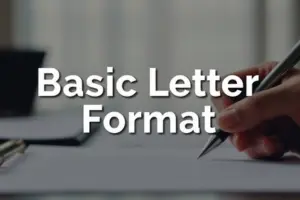What is a Business Letter? Importance, Types & Key Features Explained
Published: 10 Nov 2024
Welcome Dear learners,
In the professional world, a well-written business letter can make all the difference. Picture this: You’re a new manager eager to make a strong impression on your team. Your first big task? Writing a business letter to a potential client. But as you sit down to write, you realize… you’re not exactly sure where to start. Think of it like a handshake through words—a business letter sets the tone and leaves an impression, just as if you were meeting someone face-to-face.
As Mark Twain once said,
“The right word may be effective, but no word was ever as effective as a rightly timed pause.”As Mark Twain
In the world of business, the “right word” can open doors, build relationships, and even seal deals.
In this article, we’ll explore the world of business letters, including what is a business letter and why they are essential in today’s professional landscape. We’ll cover the main features of an effective business letter, the different types and when to use them, as well as the pros and cons of utilizing business letters in your communication strategy.
So if you’re ready to boost your communication skills and build stronger professional relationships, stay with us as we dive into the world of business letters!
1. What Exactly is a Business Letter?
A business letter is more than just a piece of paper with words—it’s a formal way of communicating professionally. Imagine it as a bridge between two people or companies, helping them share important information, make requests, solve issues, or even create new business opportunities. Written in a polite, straightforward style, a business letter shows respect, professionalism, and clarity.

Unlike a casual message, a business letter follows a set structure and language that makes it suitable for the workplace. This could be anything from a job offer, a thank-you note, a complaint, or even a contract. Each word, sentence, and detail in a business letter is chosen carefully to make sure the message is clear, respectful, and impactful.
2. Why Are Business Letters Essential in Today’s World?
Today, business letters still hold a special place. They act as trusted messages in the professional world, adding a level of respect and formality that casual messages don’t have.
Business letters aren’t just for passing information—they help build trust and create strong relationships. They’re used in important situations, like offering jobs, signing agreements, or solving problems.

Even with so many digital options, a business letter shows seriousness and commitment. This makes them essential because they let us communicate clearly and professionally, keeping respect at the centre.
3. Key Features That Make a Business Letter Effective
For a business letter to truly make an impact, it needs certain essential features. Here are the key elements that make a business letter clear, professional, and effective:

1. Clear Purpose: Every business letter should have a specific goal. Whether it’s a job offer, a request, or an invitation, the purpose should be clear from the beginning so the reader understands the message.
2. Polite Tone: Respect and politeness are crucial in any business letter. Using polite and professional language shows that you value the reader and helps build trust.
3. Structured Format: An effective business letter follows a standard structure—usually starting with a heading, followed by the main message, and ending with a polite closing. This organized flow makes the letter easy to read.
4. Concise Language: A good business letter avoids unnecessary words. It delivers the message in a direct, straightforward way, saving time and keeping the reader’s attention.
5. Professional Appearance: Formatting matters! A well-typed, neatly spaced letter with the right font makes a strong impression. A professional appearance shows attention to detail, which is essential in business.
These features come together to make a business letter effective and leave a lasting impression. By following these, you can create business letters that are professional, respectful, and easy to understand.
4. Different Types of Business Letters and When to Use Them

Business letters come in various types, each serving a unique purpose. Using the right letter at the right time can make communication smoother and more effective. Let’s take a look at some common types of business letters and their uses:
1. Job Offer Letters: When a company hires someone, they send a job offer letter. This letter officially extends the job offer and welcomes the candidate onboard.
2. Request Letters: When you need specific information or help, a request letter comes in handy. It’s best to keep it polite and clear to ensure easy understanding.
3. Complaint Letters: When there’s an issue with a product or service, a complaint letter can highlight the problem and ask for a solution, usually in a polite tone.
4. Thank-You Letters: These letters are used to express appreciation, helping to build and strengthen professional relationships.
5. Resignation Letters: When someone decides to leave their job, they submit a resignation letter, which includes their leaving date and a brief exit plan.
6. Invitation Letters: These letters invite people to special events, meetings, or workshops, providing details on the time and place.
If you’d like to dive deeper into other types of letters beyond business ones, our page Types of Letters covers everything in more detail, helping you choose the perfect letter for any situation.
5. Pros and Cons of Using Business Letters in Professional Communication
Business letters are a core part of the professional world, with both advantages and a few disadvantages that come along. Let’s look at how they help—and sometimes challenge—effective communication in a business setting.
| Pros of Business Letters: |
|---|
|

| Cons of Business Letters: |
|---|
|
Business letters remain a valuable tool in professional settings, but knowing when to use them best can help you balance these pros and cons, making your communication more efficient and impactful.
Conclusion
Understanding the value and proper use of business letters can make a big difference in professional communication. They add a level of professionalism that emails and texts often lack, helping to build stronger relationships and a credible image.

Here’s a quick recap of what we covered in this article:
- Definition of a Business Letter: Clear, professional communication used for formal purposes.
- Importance in Today’s World: Builds trust, maintains professionalism, and improves understanding in business relationships.
- Main Features: Structured format, formal language, and purpose-driven content make business letters effective.
- Types of Business Letters: Different kinds serve different needs, like job offers, thank-you notes, and requests.
- Pros and Cons: They add professionalism and clarity but can be time-consuming and slower in response.
So, now that you know what is a business letter, whether you’re reaching out to a new client, following up with a business partner, or applying for a job, understanding the right way to write a business letter can make all the difference. Practice these techniques, and soon, writing a strong business letter will feel like second nature!
What have you learned from this article? Let us know in the comments section below! And don’t forget to follow us on social media for more helpful tips and updates!

- Be Respectful
- Stay Relevant
- Stay Positive
- True Feedback
- Encourage Discussion
- Avoid Spamming
- No Fake News
- Don't Copy-Paste
- No Personal Attacks

- Be Respectful
- Stay Relevant
- Stay Positive
- True Feedback
- Encourage Discussion
- Avoid Spamming
- No Fake News
- Don't Copy-Paste
- No Personal Attacks








